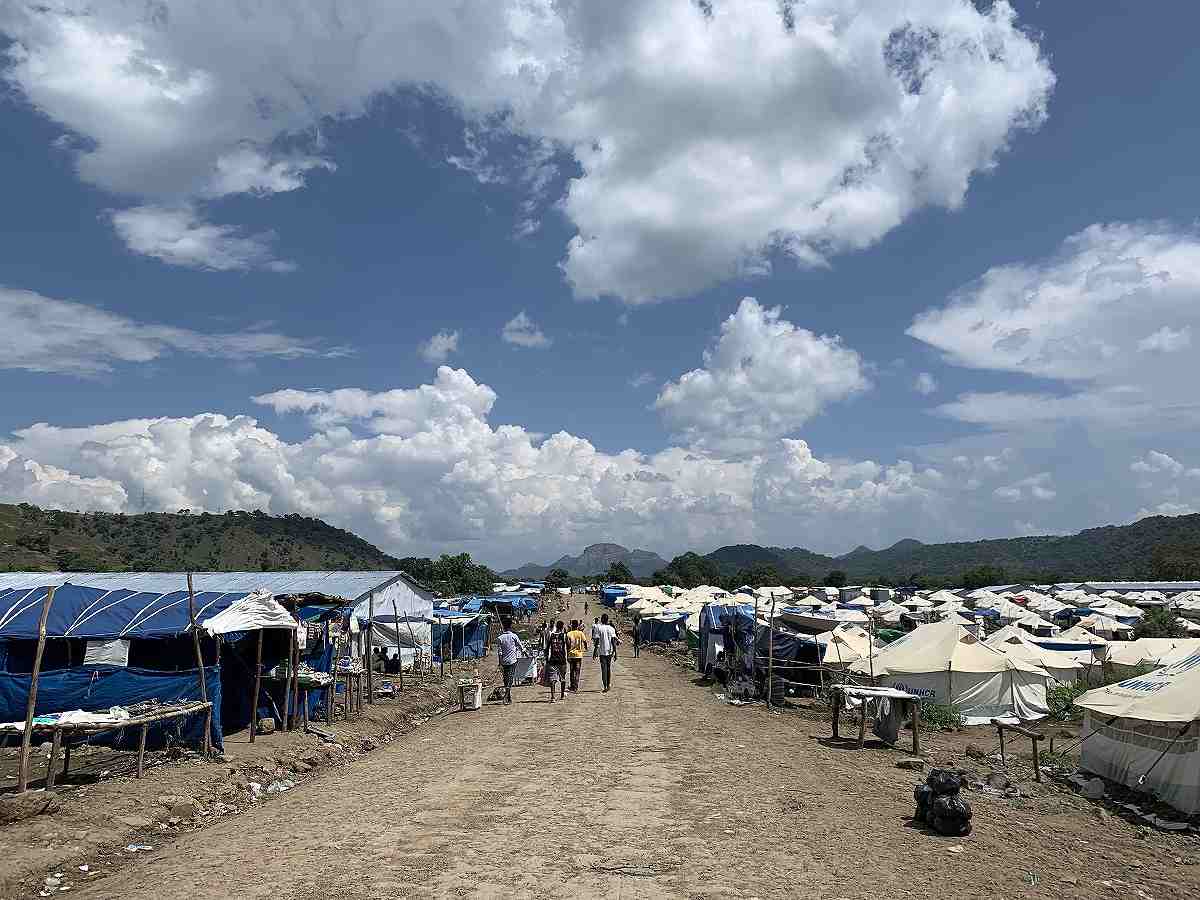
A refugee camp where both Sudanese and Eritrean refugees have been attacked, killed and kidnapped for ransom by local gunmen.
17:17 JST, December 1, 2023
METEMA, Ethiopia – The two warring sides in Sudan have been forcibly recruiting civilians to join the fight, and conditions in some refugee camps outside the country are so awful that some men who fled have returned to Sudan, only to be captured and pressed into combat, refugees said.
Thousands of Sudanese began flooding across the eastern border into Ethiopia in July, the U.N. refugee agency reported, mainly young men who said they were fleeing forced recruitment. Many have ended up in the U.N.’s Kumer camp in the Amhara region.
With humanitarian assistance in the camp running short, Fatna Ibrahim said she saw her youngest, 15-year-old Mustafa, return to Sudan and into the grasp of the Rapid Support Forces (RSF), a paramilitary group fighting the Sudanese military.
The RSF had already forcibly recruited her husband and eldest son just days after the civil war broke out on April 15, she recounted. Fighters had burst into their home in the Sudanese capital, Khartoum, seizing Fatna and her teenage daughter to rape them. Desperate to save them, her husband, a retired soldier, offered to join their ranks.
“He said, ‘leave them alone and take me. I was a soldier and I can fight,'” said Fatna, 43, wiping away tears with her striped headscarf. She recalled regaining consciousness after fainting to find her husband and 22-year-old son had been taken.
Terrified, she shepherded Mustafa and his sister through countless checkpoints to the Ethiopian border. They ended up at a camp rife with violence, cholera and hunger. In August, Mustafa told his mother he would die if he stayed.
He returned to their tiny home in Khartoum, near a now-destroyed military base where she used to work as a laundress to pay for English lessons that she dreamed would bring her a brighter future. Weeks after he left Ethiopia, her phone rang. Mustafa was whispering, so his captors did not hear him.
“He said, ‘Mum, I’ve been taken to fight,'” she said, beginning to weep again. “‘He said, ‘If I die, please forgive me for coming back.'” After he hung up, she fell to the ground, wails bringing her neighbors running. “Oh God,” she cried. “If one of us has to die, please let it be me. I have lost everything.”
Months after she fled Sudan, a neighbor called to say her husband’s body had been recovered; it was unclear how he died. “I didn’t even get to say goodbye,” Fatna said.
Before the conflict erupted, the RSF head, Gen. Mohamed Hamdan Dagalo, known as Hemedti, and military chief Gen. Abdel Fattah al-Burhan had collaborated to topple Sudan’s former dictator and crack down on pro-democracy protesters, but then turned on each other.
Their fight has leveled the formerly gracious capital city. Hospitals have been shelled, airstrikes have pummeled residential neighborhoods and ravenous fighters have raped, kidnapped and killed countless civilians. In western Sudan, fighting has morphed into ethnic cleansing as militias raze villages and execute families. The RSF has seized four regional capitals in the western region of Darfur in the past month and are encircling the final city.
The United Nations says Sudan faces one of the world’s “worst humanitarian crises,” with more than 6 million people forced to flee, 25 million needing aid and 19 million children out of school. But with international attention focused on Ukraine and now Israel and Gaza, necessary funding is falling far short. Refugees facing disease, hunger and danger are getting little help.
For many fleeing the war, the violence is nightmarishly familiar. James Nicolas Biegene, 23, said his mother and five siblings were killed in South Sudan’s civil war before his uncle took him to Khartoum seven years ago, hoping to save the boy from the slaughter. In July, the Sudanese military knocked at their door.
The soldiers told his uncle he had to join their fight, Biegene said. His uncle refused. They killed him. The soldiers were unaware Biegene was inside, he said, and moved onto the next house. He was able to flee to Ethiopia but said he’d heard of many young men who were rounded up to fight.
Nearly 50,000 people have fled into Ethiopia since the civil war started, but arrivals have dwindled in recent weeks after refugees heard there was no food and little assistance. At just one border crossing, nearly 800 Sudanese were recorded crossing back into Sudan in recent months, U.N. officials said.
Neither the RSF nor the military responded to queries about forced recruitment for this article.
Esam Abajar Ahmed, 28, an accounting student before the war, fled to Ethiopia. Eight of his friends did so as well but found conditions in the camp so bad that they returned to Sudan, he said.
The RSF detained six of them at a checkpoint on the edge of Khartoum, he said. When the other two saw what was happening, they hid. The six others were kept handcuffed without food for a week until they agreed to fight, he said. “They were taken before they had even got home and seen their families,” he said sadly.
Eventually, one of the six managed to phone the two who escaped. They passed a message on to the camp. The two were later killed in an airstrike, he said.
With nowhere else to go, Ahmed stayed at the Ethiopian camp, where local gunmen had started kidnapping refugees for ransom. Although penniless, some have relatives in the diaspora who could be extorted.
“There is no escape for us. No safety for us anywhere,” Ahmed said.
Inside Sudan, medical staff are especially at risk of being abducted. Ali Basher, of the Sudanese Doctors Syndicate, said 39 medical personnel had been taken by armed groups. Some had been accused of helping the opposite side and tortured, many forced to treat wounded fighters, he said.
One of Sudan’s most prominent doctors, who spoke on the condition of anonymity for fear of reprisals, nearly fell victim. An emergency room doctor, she refused to flee as her city emptied. Her first hospital, Khartoum Teaching Hospital, was bombed, so she moved to another, Al Shuhada. The wards filled with girls shot in the stomach and children writhing from burning shrapnel.
In July, the violence was so intense she shut the doors and discharged anyone who was not in danger of imminent death so she could use their beds, she said. Then the RSF arrived. As the fighters began shooting, she said, she ushered female staff out the back, fearing they would be raped.
Militiamen rampaged through the wards, assaulting patients and staff. She was beaten so badly she could not walk. The man running the blood bank tried to barricade the doors; he was shot through the heart. The militia left after a looting spree.
A week later, only five medical staff remained, she said. No aid group would take over the hospital – it was too dangerous – so they decided to stay home and took supplies to treat those injured in their neighborhoods.
“I said, I’m not leaving. I’m an emergency doctor. This is my time,” she said stoutly.
The RSF came after her.
“They came to my house and told me to go with them, that they had many wounded,” she said. She invited them to bring the wounded to her house, but they refused, she said. She begged for one last night with her three young children, explaining their father was dead. The militia posted guards outside and said they would take her – and maybe the children – in the morning.
Instead, in the dark, the family members hauled each other up and down compound walls topped with barbed wire and broken glass, and fled, she said.
When she and her family got to the Ethiopian border, military police recognized her and stopped her. They also desperately needed doctors, she said. They sat there, her children crying, for three hours before a doctor from the local hospital recognized her and announced he’d go on strike if she couldn’t cross, she said. The police relented.
Now she’s doing her best to treat fellow refugees with no drugs or equipment. She and another woman, a midwife, have delivered 13 babies so far. The night before The Washington Post visited, she said, they performed an episiotomy with a razor blade on a woman in labor by the light of a phone. No gloves. No anesthetic.
“I have to keep working. These are my people,” she said. “If they had not come for my children, I would still be in Sudan.”
Top Articles in News Services
-

Survey Shows False Election Info Perceived as True
-

Hong Kong Ex-Publisher Jimmy Lai’s Sentence Raises International Outcry as China Defends It
-

Japan’s Nikkei Stock Average Touches 58,000 as Yen, Jgbs Rally on Election Fallout (UPDATE 1)
-

Japan’s Nikkei Stock Average Falls as US-Iran Tensions Unsettle Investors (UPDATE 1)
-

Trump Names Former Federal Reserve Governor Warsh as the Next Fed Chair, Replacing Powell
JN ACCESS RANKING
-

Producer Behind Pop Group XG Arrested for Cocaine Possession
-

Japan PM Takaichi’s Cabinet Resigns en Masse
-

Man Infected with Measles Reportedly Dined at Restaurant in Tokyo Station
-

Israeli Ambassador to Japan Speaks about Japan’s Role in the Reconstruction of Gaza
-

Videos Plagiarized, Reposted with False Subtitles Claiming ‘Ryukyu Belongs to China’; Anti-China False Information Also Posted in Japan

























